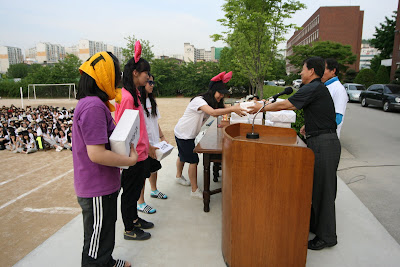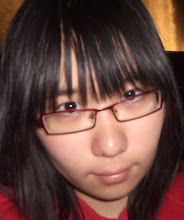Wednesday, August 11, 2010
Yoko Story: the Truth of So Far From the Bamboo Grove
I substitute my explanation with this video.
I've no hard feelings on Japan, but I believe it's true that Japan was quite cruel to Korea under their colonization. But it seems that Japanese people have no sense of apology to Korea. Japan has always been evading their responsibility and denied their wrongdoings on Korea in the past.
I've once read a book about German education, and the biggest surprise was that German students start from learning Hitler and Holocaust, their most shameful history. They learn by their heart German had made a huge mistake and that sort of thing should never happen again.
Japanese are never educated that way. Instead, they're intentionally educated to glorify their history---though it's pretty much the same with Koreans. They don't know what they should feel sorry for. I think it's a huge mistake itself.
Saturday, August 7, 2010
My Point Of View on China's Northeast Project

Goguryeo's the surely a poweful, influncial country that took a huge terriotory ranging from todasy's China and Korea. It's also the country that Koreans are proud about the most, and firmly believe to be their ancestor country.
But the thing is China has launched its Northeast Project in 2000s, claiming that Goguryeo was one of Chinese' minority governments and supposed to included in Chinese history. Of course Koreans got furious at this.
These are some main arguments on the issue.
Chinese claims that Goguryeo was found in today's Chinese territory and always stayed at it. And where Goguryeo was at belonged to Han, the Chinese government, territory.
Korean objects that Goguryeo conflicted with Han and eventually expelled Han government from their land.
Chinese claims that Goguryeo paid a tribute to China, proving that the country was subordinate to China.
Korea objects that tribute was a token gesture and there are plenty of evidences Goguryeo had its pride as an independent nation. Korea also argues that other independent nations at that time also paid a tribute to China and it's nonsense to say only Goguryeo was a subordinate.
China claims that Su and Tang had a war with Goguryeo to unite China.
Korea claims that Goguryeo fought off Su and Tang to protect their independence.
The absulute truth is that history's always on the winner's side. The powerful country writes history to show off their glory and greatness. And they reads the history favorable to them, to add to their fame and powefulness. Today China's in a superior state than Korea in a global world, so it tries to make Goguryeo history to make their history look good---it's rather political than to explore the historical truth. I heard China also wish Goguryeo (and Balhae) to be their history, in case North and South Korea's united and claim Gando territory which used to be theirs.
Perhaps Goguryeo's neither China nor Korea. There's been some evidences on this, first Goguryeo lied at Liaodong peninsula, which initially was neither Chinese or Korean territory. Its language wasn't same as Chinese or Korean; it had its uniqueness instead. Historically Goguryeo had not been dominated by China, Korea, or Japan. Its culture didn't look much like China or Korea. (I sort of agree with this, Goguryeo relics queit look different than the countries that existed at the same time...) So Goguryeo's not China nor Korea, it's just "Liaodong Nation"!
Of course I want Goguryeo to be part Korea's history. But I guess I have to be neutral at history to see every posibility and examine every basis, to have my own point of view.
Thursday, August 5, 2010
Gojoseon, Myth or Real?

Monday, July 12, 2010
Korean Students' English Ability
Why this result? Because English education in Korea is sadly distorted. (I think this has started from Japan colonization period, bad for Korea) Focus so much on reading and grammar. A teacher reads the whole paragraph, they ask you to underline certain lines, and they tell you what grammar's used and what vocabulary's important, that kinds of stuff, and the students take note of them. You can see how BORING it would be to do this the whole year. So they don't get to speak or write anything.
Some people insists Korean students are good at reading at least, because that's all they do during their three years of high school. But I think, well, no. Okay it seems, but they get stuck with reading again when they're given the type of text they haven't "practiced." I say "practice" because they in fact practice for the college test. English isn't the foreign language you want to be fluent at----it's just a "means" to go to college for them.
At least they study a lot of vocabularies, so that might help them with their speaking later on!---Well, I doubt it. I think there's three types of vocabs, it's like the vocab pyramid and the ones on the bottom(the basic words, you know like boys, girls, tree). I know most of them and it's not hard to speak those words when I talk. And on the top are the "big" words, the ones you write in your essay or formal writing. And what's between them are the words that's "not" the basic words but the words people speak pretty much in their dialogues. (Maybe colloquial belongs to this category) I'm supposed to learn this vocabs from the bottom but Korean education forces us to take a English test to go to college so they make the students learn just the "big" words to read difficult texts which are on the test. It's funny that Korean students know the word "amalgamate" and don't know what "hang out" means. This is why Korean students are just afraid of speaking English! (And yes, they actually are really bad about speaking.)
Good news is, things are beginning to change. From this year, freshmen take a test something like TOEFL, which evaluates them with speaking and writing too! It's time that it should change---after all, it has been "wrong" for such a long time.
Sunday, May 30, 2010
Sports Day
.....................The Sports Day체육대회 usually takes place on May. (Typically the midterm ends on the first week of May, and it's a good way to blow off their stresses!) Students do practice a lot for all the games and sports for the day----there's sure a "competition." Third graders often take the most responsibility on arranging things for the Sports Day, possibly hassling with juniors, but they're overcoming this "seniors decide everything" tradition and trying to participating equally for the event.
Along with practicing, they make an order for their team shirts. Good way to make them stuck together.

Sometimes it's great chance to show off their characters. After all they couldn't in schooldays when they wear uniforms.

Here are some common games they do.
Rhythm Dance, the highlight of the day. In my school the first graders do. A whole class participate for harmonious work. Typical collectivisic work.
..........................................T-ball, an easier form of baseball. Girls definately aren't able to hit the ball that's thrown to them, so instead they put the ball in front of them to hit. Other rules are same as baseball.

.Jump-rope, both for individual and group. As far as I know the group one gains more points.
Race for various distances. There's also a relay with a baton, most exciting of the all.
..................................Ssireum, korean wrestling. Girls hesitate to go for it, but the game itself is lots of fun.
Hula hoop, with all kinds of difficult requests. Like three steps forward with hoop, with your one leg, ect.
Guys who don't do the sports root for the team, it also counts a lot on their total score.
At the end of the game, the team that got the most points take the first place and the class is given an award.
Saturday, May 29, 2010
Koreans' Way of Life that's Reflected on the Language (2)
In English there are words like "also, too, but, at least, just" that add up the meaning. "I'll go there" and "I'll go there too" are obviosly different, aren't they? What's unique in Korea is that many of these extra meanings and nuances are described through postpositions. 은eun, 나na 도do, 까지kkaji are the common examples.
e.g. 너 친구 얼굴 예쁘다! (Your friend's so pretty!)
너 친구 얼굴은 예쁘지.(Your friend is pretty, but.... (she's negative in other aspects.) )
너 가니? (Are you going?)
너도 가니? (Are you going too?)
c.f. Koreans usually speak without postpositions. They also speak without subjects which are obvious.
4) I you love
Yes, that's how you say in Korean! It goes like subject-objective-verb. That's why you got to listen carefully till the end!
5) Three different words for one meaning
As I said, Korean language's largely affected by Chinese. There's been a lot of foreign words since 20th century, so there's often three words to express the same concept, or at least two, Korean and Chinese. Normally Korean words are used in colloquial, and the words originated in Chinese are usually big, academic words that's used in formal writings, but there's no set standard.
e.g. 얼굴-안면(顔面), 눈알-안구(眼球)
김-증기(蒸氣)-스팀(steam)
Friday, May 21, 2010
Koreans' Way of Life that's Reflected on the Language (1)
In English, or many of other languages, there's no honorific words that's as delicate and complicated as that of Korean. For example, you call the person you're talking to "you," whether he's your friend or your dad, or your grandfather. In Korean there's appropriate word to call friends, teachers, and older people and they're always very careful about using the honorific. Typically you say formally to someone you first meet, and to someone who's older. This is why Koreans want to know how old the person is for the first thing. The honorific shows that Koreans bureaucratic thoughts: they strinctly keep the order of ranks in any form of group. (you can find out more on honorific on http://koreaworldwider.blogspot.com/2010/04/koreans-have-lots-of-honorificformal.html )
2) Segments
How many colors are there in a rainbow? The answer's two in Liberia, three in Zimbabwe, and seven in Korean. Knowing how Korean people devide out certain concepts may help you understand their culture, thoughts, and life.
e.g.1 there're the words to say three to four days before or after today in Korean.
그그저께(two days before yesterday)-그저께(a day before yesterday)-어제(yesterday)-오늘(today)-내일(tomorrow)-모레(a day after tomorrow)-글피(two days after tomorrow)-그글피(three days after tomorrow)
What's interesting's that there's no native word for "tomorrow."(내일來日 concists of chinese characters.) Some people argue that this means Korean people naturally lack the will to create out the future. Maybe, but how'd they explain there're ARE native words to say two or three days after today?
e.g.2 하늘(the sky)이 푸르다. 나뭇잎(the leaves)이 푸르다.
American people may never understand how could they think "sky" and the "leaves" have the same color, but that's how Koreans say. the adjective "푸르다" is used to say both blue and green. But I don't think that means Koreans are "dull" about colors. In Korean there're actually a tons of different words to express different colors. I think Korean ancestors didn't feel they need to distinguish between the sky and the leaves---They're all nature after all!
3) "Light" and "strong" words for sounds and actions
There're really a lot of mimetic words, and onomatopoeia. (There're many kinds that even natives don't know.) What's interesting's the "degree" of that sounds and actions can be felt different, which depends on which vowels you use.
There're two kinds of vowels: positive and negative.
positive: ㅏ(ah), ㅗ(oh)
negative: ㅓ(uh), ㅜ(ooh)
Postives sound light and bright, and negatives sound serious, heavy and dark.
e.g. 졸졸<줄줄, 똥똥하다<뚱뚱하다, 살랑살랑<설렁설렁, 팔락팔락<펄럭펄럭
Also you can say "stronger" consonents to emphasize.
e.g. 감감하다<깜깜하다<캄캄하다, 단단하다<딴딴하다<탄탄하다







